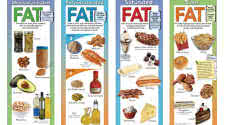Types of Fats in Foods for Bodybuilding - Good vs Bad with Examples

Not all Fats are Created Equal
In taking a look at fat, it's important to understand that not all fats are evil. Fat plays a major role in many
physiologic processes, from forming anabolic hormones to protecting your internal organs from damage. To regulate
your fat intake, you have to separate the good from the bad, and this can be confusing, with all the advice coming
at you from TV, various fitness experts and the muscle magazines (God love 'em). There are several different
classifications to keep track of.
Saturated fat is known as the granddaddy of "bad" fats; it can be found in large amounts in meat, butter, milk,
cheese, ice cream, chocolate, and coconut and palm oils. These fats are responsible for some pretty wicked effects
in your body, such as clogged arteries.
Monounsaturated fat is the first in our category of "good" fats. It is found primarily in olive oil, canola oil,
avocados and peanuts. These fats are regarded as better for you than saturated fats because their unique molecular
structure keeps them from readily forming arterial plaque.
Polyunsaturated fats are another "good" group. These fats are actually important for your health; they are used as
building blocks for creating cell membranes. Linoleic (omega-6, found in safflower and certain other vegetable oils)
and linolenic (omega-3, found in mackerel, salmon and other fish) fatty acids are very interesting, in that your body
uses them to make leukotrienes and prostaglandins: These two chemicals help regulate blood flow, immune system
function and airflow into your lungs.
Hydrogenated polyunsaturated fats which are man made, known as trans fatty acids. Food manufacturers bubble hydrogen
polyunsaturated oil under pressure, resulting in an oil that is spreadable like butter.
The process renders these "good" fats bad for you - some nutrition experts consider them as bad as lard. Examples of
hydrogenated fats are margarine and shortening. Try to avoid these when possible.
Another category of fat isconjugated linoleic acid (CLA). It's found in beef fat and all milk products except skim.
It appears to be a good fat, except nature hid it in some bad places. CLA may inhibit the growth of some cancers and
may actually act as an anabolic stimulator in humans, though its mechanism of action is not known.
As a bodybuilder, there are a few basic guidelines you should follow as far as your fat intake.
1. try to keep saturated fats to a minimum
2. when you do eat fat, make sure it comes from either the polyunsaturated or monounsaturated family
3. follow the American Heart Association recommendation to keep your fat intake below 30% of total calories. As a
final tip, don't be overly obsessive about fat. It's a necessary part of your food intake as a bodybuilder, not only
to promote good health, but also to assist gains in muscle.